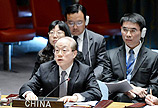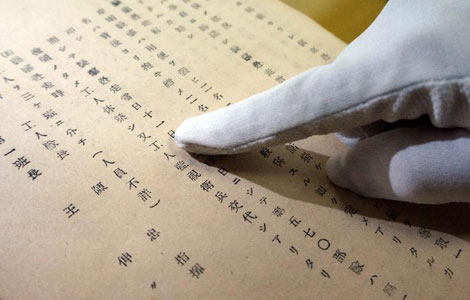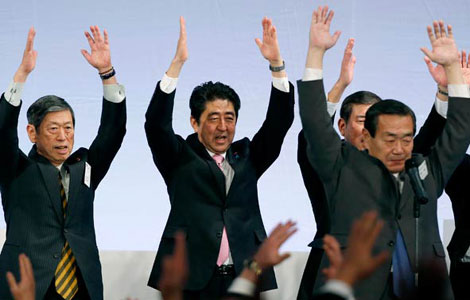

 China, South Korea and the Democratic People's Republic of Korea blasted Japanese Prime Minister Shinzo Abe's recent visit to the notorious Yasukuni Shrine at a UN Security Council open debate.
China, South Korea and the Democratic People's Republic of Korea blasted Japanese Prime Minister Shinzo Abe's recent visit to the notorious Yasukuni Shrine at a UN Security Council open debate.
 Photo taken on Jan 10, 2014 shows a report by Japanese Military Police of Kwangtung Army about the escape of forced Chinese laborers on Sep 22, 1943, in Changchun, capital of Northeast China's Jilin province.
Photo taken on Jan 10, 2014 shows a report by Japanese Military Police of Kwangtung Army about the escape of forced Chinese laborers on Sep 22, 1943, in Changchun, capital of Northeast China's Jilin province.
The Japanese education ministry has made plans to incorporate Japan's claim to the Diaoyu Islands into teaching manuals for the nation's high schools, Japan's NHK national television channel reported on Jan 12.
Washington is dispatching two diplomats to East Asia to fine-tune the US pivot to Asia-Pacific by "quenching the fire" between China and Japan, after recent provocative moves by Tokyo that have further threatened regional stability.
 Japan's ruling party vowed to continue visits to the Yasukuni Shrine and push ahead constitutional revision, leading the country in a far-right direction.
Japan's ruling party vowed to continue visits to the Yasukuni Shrine and push ahead constitutional revision, leading the country in a far-right direction.
China on Monday warned against any provocative action and escalation by Japan on the Diaoyu Islands issue in response to a reported plan by Japan to claim the islands in a guideline for creating school textbooks.
 Japan has sent senior diplomats on far-flung missions worldwide to justify the visit by Shinzo Abe to Yasukuni Shrine, which honors war criminals.
Japan has sent senior diplomats on far-flung missions worldwide to justify the visit by Shinzo Abe to Yasukuni Shrine, which honors war criminals.
China is taking a tougher stance toward Japan, observers said, after a state councilor condemned Japanese Prime Minister Shinzo Abe's visit to a shrine honoring its war dead, including war criminals.
Japanese Prime Minister Shinzo Abe's latest visit to the controversial Yasukuni shrine may have stirred a wider range of condemnation than he had expected.
 Abe's visit to the notorious Yasukuni Shrine in Tokyo is a flagrant denial of the just trials of Japanese warmongers guilty of crimes against humanity.
Abe's visit to the notorious Yasukuni Shrine in Tokyo is a flagrant denial of the just trials of Japanese warmongers guilty of crimes against humanity.
The international community and China should not be fooled by Abe's excuses, instead it is time for them to seriously reconsider their relationship with Japan.
Japanese Prime Minister Shinzo Abe's visit to the Yasukuni Shrine on Thursday prompted Japan's own politicians, including one of Abe's political allies, to express their concerns about Japan's future path and its relations with Asian neighbors.